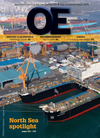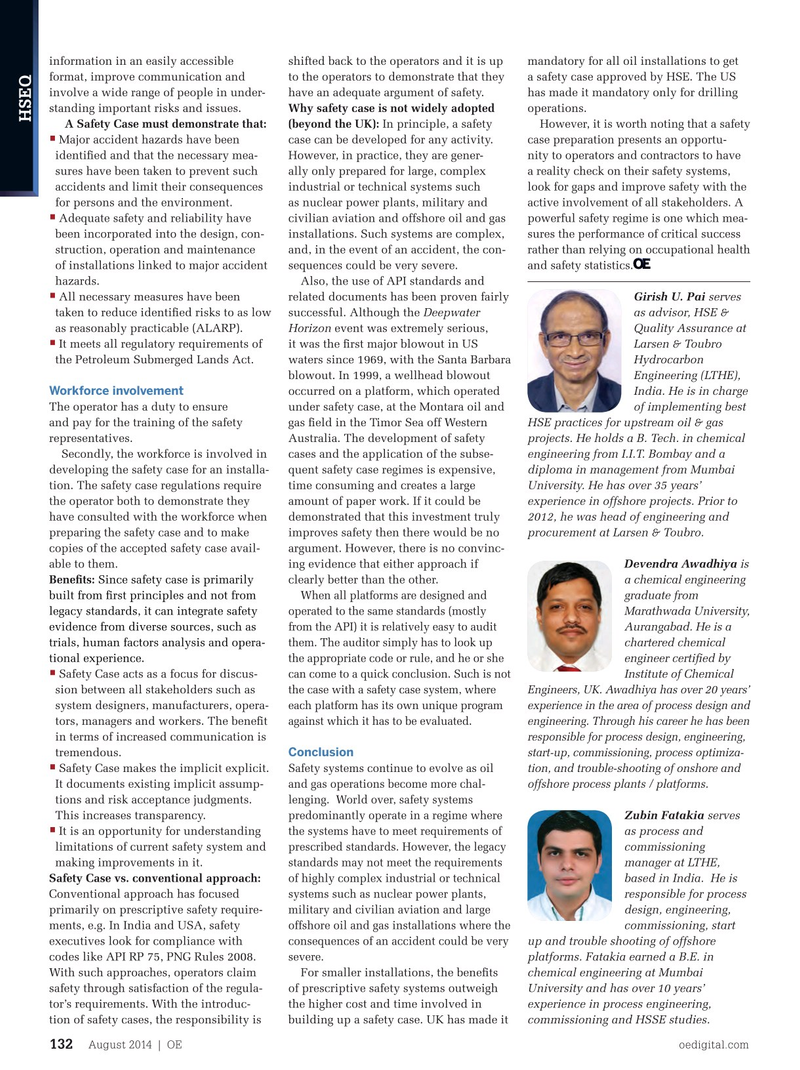
Page 130: of Offshore Engineer Magazine (Aug/Sep 2014)
Read this page in Pdf, Flash or Html5 edition of Aug/Sep 2014 Offshore Engineer Magazine
information in an easily accessible shifted back to the operators and it is up mandatory for all oil installations to get format, improve communication and to the operators to demonstrate that they a safety case approved by HSE. The US involve a wide range of people in under- have an adequate argument of safety. has made it mandatory only for drilling standing important risks and issues. Why safety case is not widely adopted operations.
HSEQ A Safety Case must demonstrate that: (beyond the UK): In principle, a safety However, it is worth noting that a safety •
Major accident hazards have been case can be developed for any activity. case preparation presents an opportu- identifed and that the necessary mea- However, in practice, they are gener- nity to operators and contractors to have sures have been taken to prevent such ally only prepared for large, complex a reality check on their safety systems, accidents and limit their consequences industrial or technical systems such look for gaps and improve safety with the for persons and the environment. as nuclear power plants, military and active involvement of all stakeholders. A
Adequate safety and reliability have civilian aviation and offshore oil and gas powerful safety regime is one which mea- • been incorporated into the design, con- installations. Such systems are complex, sures the performance of critical success struction, operation and maintenance and, in the event of an accident, the con- rather than relying on occupational health of installations linked to major accident sequences could be very severe. and safety statistics. hazards. Also, the use of API standards and
All necessary measures have been related documents has been proven fairly Girish U. Pai serves • taken to reduce identifed risks to as low successful. Although the Deepwater as advisor, HSE & as reasonably practicable (ALARP). Horizon event was extremely serious, Quality Assurance at
It meets all regulatory requirements of it was the frst major blowout in US Larsen & Toubro • the Petroleum Submerged Lands Act. waters since 1969, with the Santa Barbara Hydrocarbon blowout. In 1999, a wellhead blowout Engineering (LTHE),
Workforce involvement occurred on a platform, which operated India. He is in charge
The operator has a duty to ensure under safety case, at the Montara oil and of implementing best and pay for the training of the safety gas feld in the Timor Sea off Western HSE practices for upstream oil & gas representatives. Australia. The development of safety projects. He holds a B. Tech. in chemical
Secondly, the workforce is involved in cases and the application of the subse- engineering from I.I.T. Bombay and a developing the safety case for an installa- quent safety case regimes is expensive, diploma in management from Mumbai tion. The safety case regulations require time consuming and creates a large University. He has over 35 years’ the operator both to demonstrate they amount of paper work. If it could be experience in offshore projects. Prior to have consulted with the workforce when demonstrated that this investment truly 2012, he was head of engineering and preparing the safety case and to make improves safety then there would be no procurement at Larsen & Toubro. copies of the accepted safety case avail- argument. However, there is no convinc- able to them. ing evidence that either approach if Devendra Awadhiya is
Benefts: Since safety case is primarily clearly better than the other. a chemical engineering
When all platforms are designed and built from frst principles and not from graduate from operated to the same standards (mostly legacy standards, it can integrate safety Marathwada University, from the API) it is relatively easy to audit evidence from diverse sources, such as Aurangabad. He is a them. The auditor simply has to look up trials, human factors analysis and opera- chartered chemical the appropriate code or rule, and he or she tional experience. engineer certifed by •
Safety Case acts as a focus for discus- Institute of Chemical can come to a quick conclusion. Such is not sion between all stakeholders such as the case with a safety case system, where Engineers, UK. Awadhiya has over 20 years’ experience in the area of process design and system designers, manufacturers, opera- each platform has its own unique program engineering. Through his career he has been tors, managers and workers. The beneft against which it has to be evaluated.
responsible for process design, engineering, in terms of increased communication is
Conclusion start-up, commissioning, process optimiza- tremendous.
• Safety systems continue to evolve as oil tion, and trouble-shooting of onshore and
Safety Case makes the implicit explicit. and gas operations become more chal- offshore process plants / platforms.
It documents existing implicit assump- tions and risk acceptance judgments. lenging. World over, safety systems
This increases transparency. Zubin Fatakia serves predominantly operate in a regime where •
It is an opportunity for understanding as process and the systems have to meet requirements of limitations of current safety system and commissioning prescribed standards. However, the legacy making improvements in it. manager at LTHE, standards may not meet the requirements
Safety Case vs. conventional approach: based in India. He is of highly complex industrial or technical
Conventional approach has focused responsible for process systems such as nuclear power plants, primarily on prescriptive safety require- design, engineering, military and civilian aviation and large ments, e.g. In India and USA, safety commissioning, start offshore oil and gas installations where the executives look for compliance with up and trouble shooting of offshore consequences of an accident could be very codes like API RP 75, PNG Rules 2008. platforms. Fatakia earned a B.E. in severe.
With such approaches, operators claim For smaller installations, the benefts chemical engineering at Mumbai safety through satisfaction of the regula- of prescriptive safety systems outweigh University and has over 10 years’ tor’s requirements. With the introduc- the higher cost and time involved in experience in process engineering, tion of safety cases, the responsibility is building up a safety case. UK has made it commissioning and HSSE studies.
August 2014 | OE oedigital.com 132 042_OE0814_EPIC1_safety.indd 132 7/23/14 1:28 AM

 129
129

 131
131